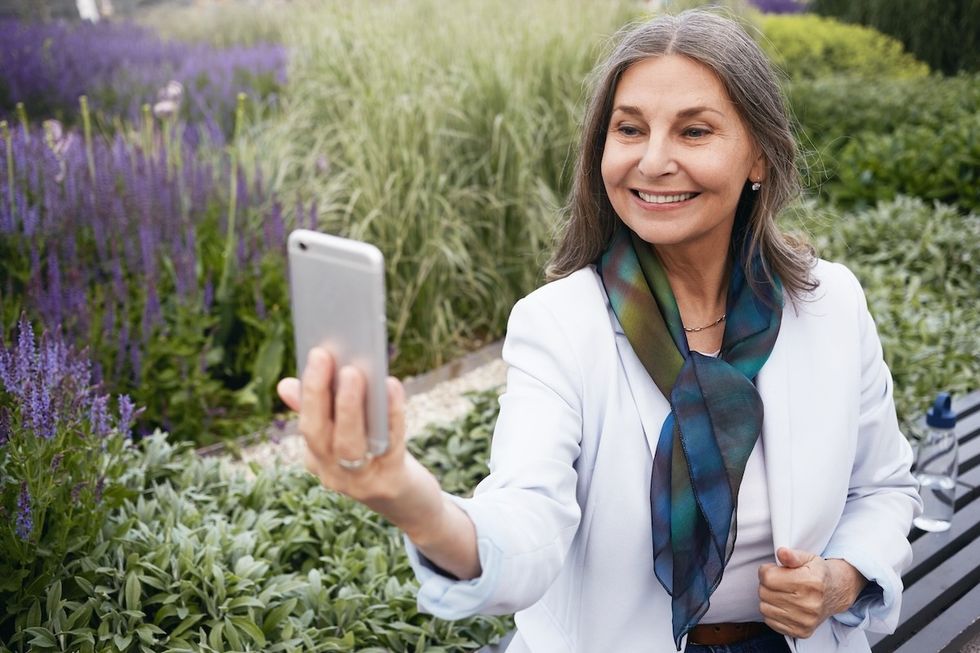Even the least vain among us have probably retaken a selfie more than once. Who doesn’t want to be seen in their best light? But it turns out that selfies may be much more than a fun photo to text to friends or post on social media. Scientists now believe that a selfie may have the power to predict how long you’ll live and how healthy you’ll be.
RELATED: Doctor Says 102-Year-Old Woman Is “Off the Charts”—Here Are Her Longevity Secrets.
Scientists say a new AI tool can predict a patients’ biological age from a photograph.
Scientists at Boston’s Mass General Brigham say they’ve designed an AI model that can predict a person’s biological age—how your body’s cells and tissues are aging, as opposed to your chronological age—from a photograph. They published their findings this month in the journal The Lancet Digital Health.
In the study, the authors explain that “physical appearance can yield insights into biological age and physiological health more reliably than chronological age.” However, in current medicine, doctors only use appearance in a “subjective and non-standardized way.”
That’s why they developed FaceAge, “a deep learning system to estimate biological age from easily obtainable and low-cost face photographs.”
Scientists trained the tool using photographs of nearly 59,000 presumed healthy individuals aged 60 years or older. They then tested it on 6,200 cancer patients and compared the results to those of 533 individuals without cancer.
On average, they found that patients with cancer looked five years older than their chronological age. Additionally, the older a patient looked, the worse their odds of survival. Conversely, chronological age was not an accurate predictor of cancer survival.
According to The Washington Post, the scientists then asked eight doctors to determine terminal cancer patients’ chances of survival based on three criteria: their photograph alone, the photograph and clinical information; and FaceAge and clinical information.
Raymond Mak, a radiation oncologist at Mass General Brigham and one of the lead investigators for the study told the Post, that their accuracy broke down as follows:
- Photo alone: 61 percent
- Photo + clinical info: 74 percent
- FaceAge + clinical info: 80 percent
Therefore, the researchers believe that FaceAge “can estimate biological age from face photographs and thereby enhance survival prediction in patients with cancer,” states the study.
RELATED: Obesity Fast-Tracks Your Biological Age—But One Diet Can Reverse It, New Study Says.
How could FaceAge be used in a medical setting?
The Washington Post shares that Mak detailed in a news conference how he met an 86-year-old man with terminal lung cancer four years ago.
“Some doctors would hesitate to offer cancer treatment to someone in their late 80s or 90s with the rationale that the patient may die of other causes before the cancer progresses and becomes life-threatening,” he explained. “But he looked younger than 86 to me, and based on the eyeball test and a host of other factors, I decided to treat him with aggressive radiation therapy.”
More recently, when the patient was 90, Mak ran his photo through FaceAge. “We found he’s more than 10 years younger than his chronological age,” Mak said, adding that the patient is “still doing great.”
Additionally, the scientists shared how they provided FaceAge with photographs of the actors Paul Rudd and Wilford Brimley when they were both 50 years old. The AI tool said Rudd’s biological age was 42.6, while Brimley’s was 69. Brimley died in 2020 at the age of 85.
However, the scientists are quick to point out that FaceAge is not intended to replace a doctor’s assessment but rather to serve as a piece of the larger clinical puzzle.
RELATED: Longevity Expert Says Avoid Eating the “Poisonous 5 Ps” If You Want to Live to 100.
Is FaceAge available now?
FaceAge is not ready for clinical settings yet, as the study authors note that further research is needed.
For one, the photographs they used to train the model were pulled from Wikipedia and IMDB and may not be representative of the larger population. As Live Science notes, these photos may also not “account for factors like plastic surgery, lifestyle differences, or images that have been digitally retouched.”
In addition to validating their results through larger cohorts, the researchers want to test whether FaceAge can work on patients with diseases other than cancer.
If and when FaceAge is approved by the Food & Drug Administration (FDA), it would require a strict set of ethical guidelines.
“This technology can do a lot of good, but it could also potentially do some harm,” study author Hugo Aerts, director of the Artificial Intelligence in Medicine program at Mass General Brigham, told The Washington Post.
Aerts added that hospitals have “very strong governance committees and regulatory guidelines that they have to adhere to [to] make sure these AI technologies are being used in the right way, really only for the benefit of the patients.”
In a press release, Mak concluded: “This opens the door to a whole new realm of biomarker discovery from photographs, and its potential goes far beyond cancer care or predicting age. As we increasingly think of different chronic diseases as diseases of aging, it becomes even more important to be able to accurately predict an individual’s aging trajectory. I hope we can ultimately use this technology as an early detection system in a variety of applications, within a strong regulatory and ethical framework, to help save lives.”
Content shared from bestlifeonline.com.

